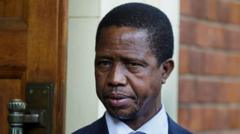A poignant state funeral in Iran paid tribute to around 60 individuals, including high-ranking military officials and nuclear scientists, who lost their lives during the recent conflict with Israel. In a deeply emotional ceremony, mourners gathered to honor those fallen while political tensions between Iran and the U.S. escalate.**
Iran Commemorates Military Leaders Lost in Recent Israel Conflict**

Iran Commemorates Military Leaders Lost in Recent Israel Conflict**
State funeral held in Tehran for military personnel and scientists killed amid 12-day hostilities.**
A solemn state funeral was conducted in Tehran to honor approximately 60 military leaders and nuclear scientists who were killed in a recent 12-day conflict with Israel. The funeral took place near Enghelab Square, where coffins draped in Iranian flags and adorned with portraits of the deceased were surrounded by an outpouring of grief from massive crowds. This somber event follows a ceasefire earlier this week, which was made possible after U.S. forces conducted airstrikes on key Iranian nuclear facilities.
Dressed in black as a sign of mourning, thousands of attendees chanted slogans, waved the national flag, and held images of those who perished. In an effort to mobilize the public, authorities launched an extensive media campaign and provided free transportation while government offices remained closed for the day. Among the fallen was Mohammad Bagheri, the commander of Iran's armed forces, who was interred alongside his wife and daughter, victims of Israeli strikes.
Iranian officials reported a total of 627 casualties within Iran due to the violence, while Israeli sources indicated that 28 people had died from missile strikes launched by Iranian forces. Notable figures in attendance included Iranian President Masoud Pezeshkian and Rear Admiral Ali Shamkhani, a key advisor to Supreme Leader Ayatollah Ali Khamenei, who himself was injured in the latest hostilities.
This event unfolds against the backdrop of escalating tensions between Iran and the United States, particularly after comments from President Donald Trump suggesting readiness to escalate military action against Iran should its nuclear ambitions appear threatening. In a recent briefing, Trump reinforced his stance, telling the press it would be justified to carry out additional bombings if credible intelligence suggested that Iran was enriching uranium to dangerous levels.
Iran’s Foreign Minister Abbas Araghchi has reacted strongly to Trump’s remarks, urging a more respectful discourse from the U.S. about Iran's leadership. He underscored that while the strikes did cause considerable damage to Iran's nuclear infrastructure, Khamenei's assertion that the U.S. and Israel have not succeeded in their objectives still stands.
As global eyes remain focused on Tehran, the head of the International Atomic Energy Agency (IAEA) announced that the full extent of damage to Iran's nuclear capabilities remains uncertain, emphasizing the need for diplomatic solutions rather than military interventions to curtail Iran's weapons proliferation. Meanwhile, Trump claimed he was close to negotiating sanctions relief for Iran but felt deterred by Khamenei’s rhetoric.
In the wake of the conflict, the atmosphere in Tehran and among its residents remains charged, showcasing a city recovering yet grappling with the deep scars left by the violence.





















